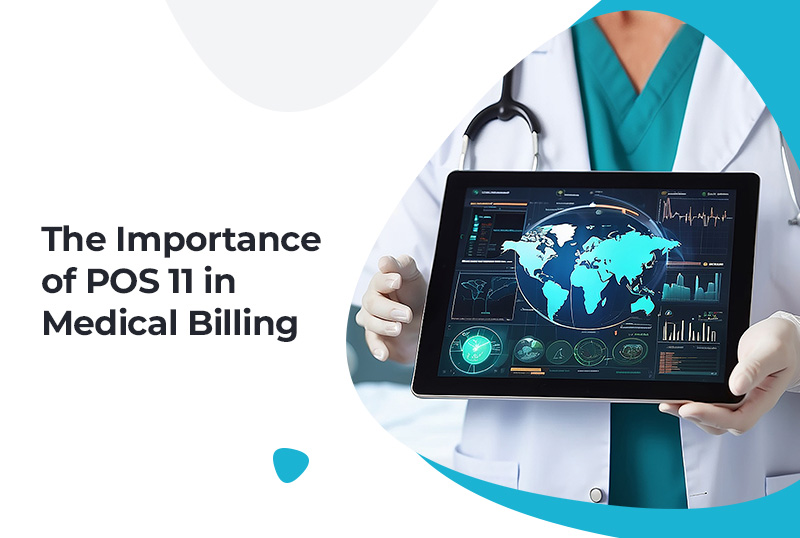Have you ever wondered why your doctor’s bill might vary depending on where you saw them? It’s all about a secret code system called Place of Service (POS) or POS 11 codes. These codes tell insurance companies where you got your treatment, which affects how much they’ll pay.
The Centres for Medicare & Medicaid Services (CMS) assigns a code to the location of these private practices. These two-digit Place of Service (POS) codes allow insurance companies to accurately calculate the proper reimbursement rates.
So, next time you see your doctor, remember that these Place of Service 11 play an important role in medical billing services!
Expert Medical Billings Services For Optimizing Your Revenue & Driving Your Practice To Success!
What is POS 11?
POS 11 is a code assigned to a doctor’s office, used to bill for outpatient services. These services are not provided in a hospital but in a private practice. This includes routine check-ups, minor procedures, and other medical care provided in a community-based setting.
The Role of POS 11 in Reimbursement
POS codes have a direct impact on reimbursements. For Medicare, POS 11 is classified as a “VIP” code. Medicare often pays more for office visits (POS 11) than for facility-based care, such as outpatient hospitals (POS 22-23 or ambulatory surgery centres (POS 24). This is because the overhead costs in an office are typically cheaper than in a hospital.
The Importance of Place of Service 11 in Claim Submission
Place of service 11 is important to successfully submitting and processing healthcare claims. Below are some of the reasons how they can impact the claim submission:
1. Proper Reimbursement
Accurate POS codes ensure providers receive the correct payment for their services.
2. Billing Compliance
Using the wrong POS code can lead to claim denials and regulatory issues.
3. Claim Approval
Correct POS codes help expedite the claim approval process.
Common Mistakes in Using POS 11 Codes
POS 11 codes are important, but if they are utilized incorrectly, leading to errors and delays in claim processing. Here are some common mistakes to avoid:
1. Mixing Up Codes
Using POS 11 for non-office settings can mix up codes and cause inaccuracy.
2. Incomplete Documentation
More medical records are needed to justify the use of Place of Service 11.
3. Inconsistent Coding Practices
Different staff members code the same services differently.
Best Practices for Providers
Healthcare providers ensure accurate and efficient use of POS 11 codes by following these best practices:
1. Understand POS 11 Correctly
Ensure staff fully understand its definition and application.
2. Stay Updated
Keep up with coding updates and regulations.
3. Use Technology
Use billing software with automated code suggestions and error checks.
4. Audit Regularly
Conduct periodic audits to identify coding errors.
5. Collaborate with Payers
Maintain open communication with insurance companies.
6. Implement Internal Controls
Establish guidelines and procedures for coding.
7. Conduct Regular Training
Provide ongoing training for staff on coding practices.
8. Ensure Regulatory Compliance
Stay up to date with HIPAA and other relevant regulations for better compliance.
Conclusion
Using Place of Service (POS) codes correctly is important for healthcare providers to ensure accurate billing and reimbursement. By understanding the specific requirements and guidelines associated with POS 11 in medical billing, healthcare providers can minimize errors and avoid claim denials. Staying informed about the latest changes in coding regulations and best practices is also important for efficiency. By following these steps, providers can optimize their billing processes, improve their cash flow, and deliver better patient care in their medical facility.


